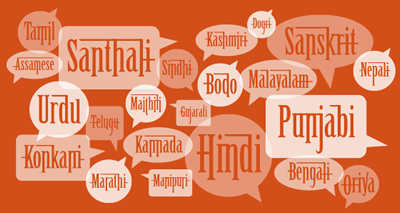Save What We speak

ABU DHABI: What if I told you that there are around 7000 languages spoken in the world? (Census) Pretty amazing, right? Now, what if I told you that India has 122 major languages and around 1600 minor language families and isolates. Are you blown away by the fact that you belong to a country that has a lot of linguistic diversity or are you proud of yourself because you knew about this? In both cases, there is not much to celebrate about, as you will not have anything to be proud about very soon.
As Indians, I feel that a majority of us take pride in the diversity that our country has, whether it is ethnic, religious or linguistic. We were taught in schools about how difficult it was to form a country like ours keeping in mind the mixture of the inhabiting people. We were so busy being arrogant about the fact that we are so diverse that we forgot about preserving the diversity itself. We have had a history of inter religious fights (one of the reasons for the division of our country in two), ethnic conflicts and extinction of languages. Wait, what!? Extinction of languages? Is that even a thing?
As soon as I say the word ‘Extinction’, the first image that would probably come to your mind would be that of the mammoth from Ice Age or a mass extinction scene from the movie World War Z starring Brad Pitt. You would also probably start counting the number of animals that you know have gone extinct (and realize that you only know about five). After all hasn’t extinction always only been about animals and zombies?
Well, it’s time I tell you about extinction of our languages as well.
Just like animals, languages go extinct as well. They disappear. People forget them. People forget about them.
There are different reasons for the endangerment or extinction of our languages and I will only cover a few of them here. The most important one according to me is neglect. The Aka-Cari language of the Andaman and Nicobar islands can serve as a good example. In 1994, it was discovered that there are only two people surviving from the tribe that could speak this language. (Sharma, 62). With the death of these two people, Aka- Cari and all the encyclopedia of information that was associated with this language was lost forever.
It is also sad to know that even natural disasters led to the extinction of a few languages. After the 2004 Tsunami a lot of people were killed who belonged to endangered tribes and spoke endangered languages.
Another reason for the disappearance of languages has also been loss of prestige of some languages and the inferiority attached to them. Labanki is one such language. Although, it has religious significance for the Sikhs, people who spoke that language in Punjab were looked down upon. Gradually, they stopped speaking the language and adopted Punjabi just like the rest of the population.
These are just the languages that have already gone extinct. There are approximately 200 Indian languages that are endangered right now and might go extinct very soon due to some of the reasons mentioned above or other ones.
For me, there are two very important reasons for us to preserve our languages. Firstly, they tell us a lot about the culture of the people who spoke them. When we lose a language we also lose all the stories, poems, songs, etc. of that language. Also, there are certain phrases and words that cannot be translated into other languages. This tells us about the uniqueness of each language
Finally as written in the BBC article ‘Languages: Why we must save dying tongues?’ “Languages are a way of interpreting the world and no two languages are the same” Just like we spend millions of rupees on saving our tigers, shouldn’t we do the same to save our languages?
However, the situation is not as bad as I have shown it to be till now. The government has realized the importance of our linguistic heritage. It recently launched a scheme known as the “Protection and Preservation of Endangered Languages of India”. Under this Scheme, the Central Institute of Indian Languages (CIIL), Mysore will work on protection, preservation and documentation of all the mother tongues/languages of India spoken by less than 10,000 people. This is a great endeavor. We need many such programs to make sure that we don’t lose our rich linguistic diversity.
(The writer is a student at New York University, Abu Dhabi)



